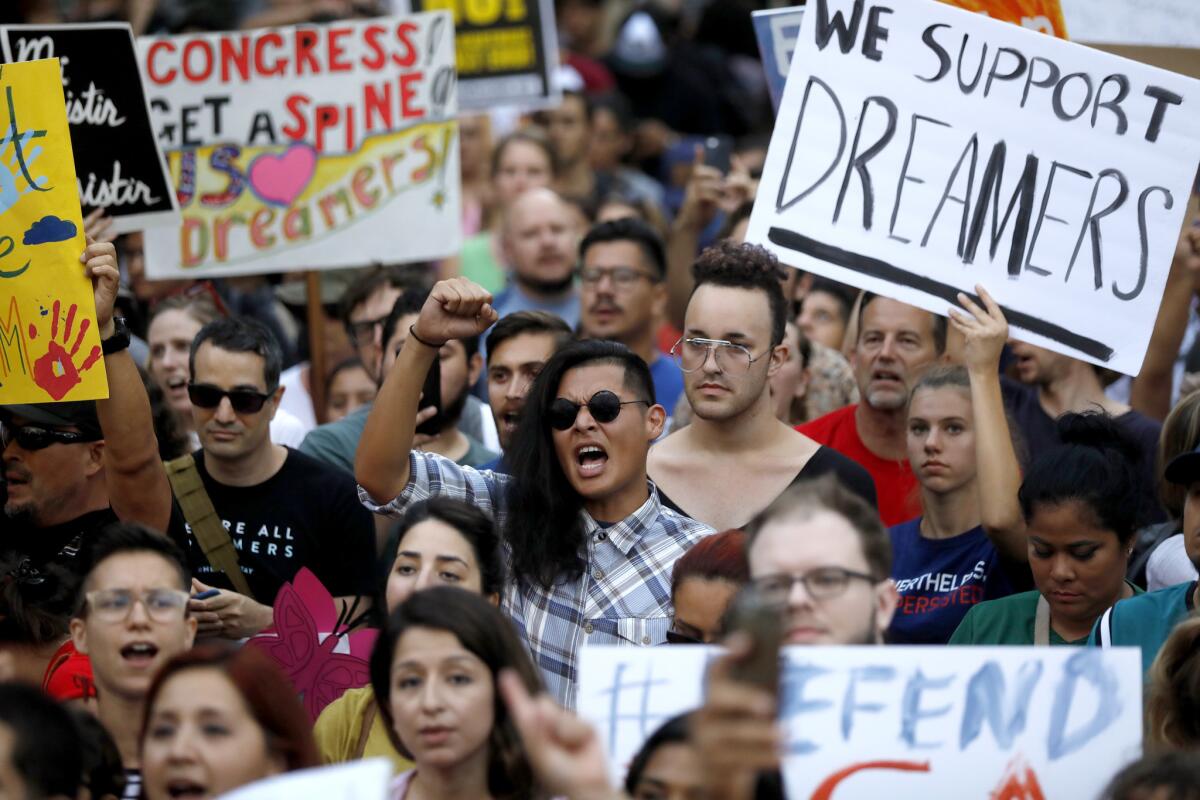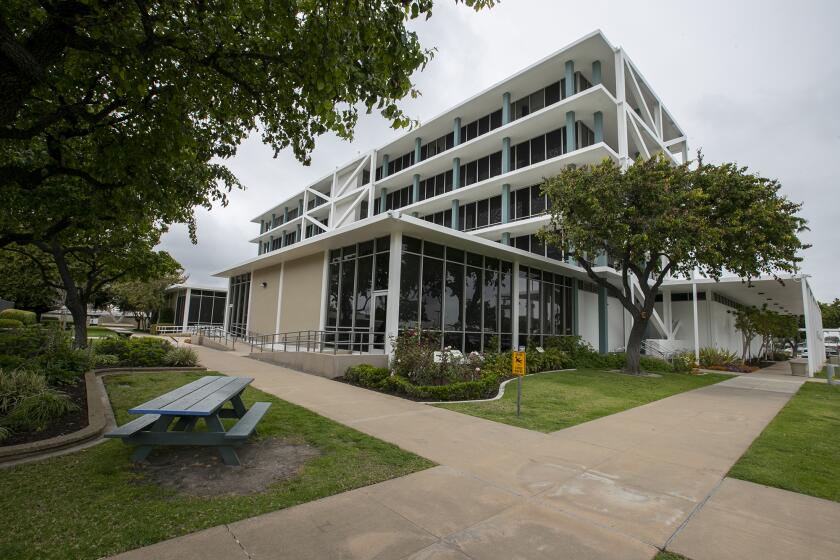‘I could finally breathe’: Orange County dreamers cautiously celebrate Supreme Court ruling on DACA

- Share via
In a win for so-called “Dreamers,” the U.S. Supreme Court on Thursday ruled against President Donald Trump’s plan to cancel a program that protected thousands of young immigrants who were brought into the country illegally as children.
The Obama administration introduced in 2012 the Deferred Action for Childhood Arrivals program, which allows young immigrants without criminal records to register with the government, apply for a work permit and obtain a driver’s license.
The decision elicited mixed responses from Dreamers in Orange County. Many were relieved, but others questioned what the ruling means for the program, themselves and their families in the future.
For Ever Arias, 30, of Orange, the ruling brings more of the uncertainty he says he and his family are used to.
Arias, who was a student at Costa Mesa’s Shalimar Learning Center, came to the U.S. when he was 7 from Michoacán, Mexico. He said he was a recipient of the program until last year, when he married his now-wife and became a green card holder.
“It’s like a little sigh of relief that at least, for now, it’s not going anywhere,” he said. “This is something that we’re used to. When I had DACA, I knew that it could go away any minute. It is not something new to us. Our life is on hold.”
At least for now, DACA will remain in effect. The court ordered that the case be remanded so that the Department of Homeland Security, which attempted to revoke DACA, could better explain its reasoning. Chief Justice John Roberts Jr. wrote in his opinion that the decision did not concern the soundness of DACA as a policy.
“We address only whether the agency complied with the procedural requirement that it provide a reasoned explanation for its action,” Roberts wrote.
Arias said some of his family are also Dreamers who are working “high-end” jobs and who were nervous for their futures if the program was repealed.
“We’re dependent on the government to determine if we can continue in this job or not. It’s unfortunate that ... if I didn’t change my status, I would be depending on DACA,” Arias said, adding that he is currently studying internal medicine in residency.
Some of his friends were also waiting for the decision to be handed down by the Supreme Court.
“We’re already stressed enough as it is. At least I am. Put on top of that, you might not even be able to continue your training, depending on the government to tell you whether you can stay in the U.S. or not,” he added. “We’ve been facing this since we got DACA. We knew it was an executive order.”
But for Eduardo Iniestra, the news came as a relief. He has lived in Costa Mesa since he was brought to the U.S. in 1994 from Mexico City when he was 12.
“As a DACA recipient ... ever since the Trump administration became a threat to try and get rid of [the program] and try to stop it, [it’s] been this heavy weight on your shoulders daily from the minute you wake up,” he said. “Something always reminds you about it.”
Iniestra, who recently graduated from Huntington Beach Adult School, reflected on how he felt when Obama first announced the program.
“It was the opposite. I cried. This amazing feeling that I haven’t felt since I’ve been here and this was the complete opposite,” he said.
Iniestra’s stress intensified after he was laid off from a job he worked at for 13 years due to the pandemic that has crippled the economy. His wife, who is also a DACA recipient, is pregnant with their first child.
He said there were nights he couldn’t sleep, especially as the decision on the program came closer and closer to being made. He said that when he found out about the ruling Thursday morning, he woke up his wife and told her, and he was surprised the ruling was so close.
“As the time drew to the decision, it was this intense buildup. You didn’t know what was going to happen. When I heard the news this morning, I could finally breathe,” he said.
Angela Chen, director of UC Irvine’s DREAM Center, said that it is difficult to sum up how many of the center’s students felt in response to the ruling, adding that the good news came with multiple layers.
“It’s a lot to take in. I think we’re all still processing what this means. I think [it’s] hard to kind of be so definitive about this ... it’s an unexpected ruling and I think it does provide reprieve for our students in terms of what is going to happen,” Chen said.
Chen said going forward that she’d like to see what the ruling means in practice, raising questions as to whether or not the DHS will be accepting new applications for DACA recipients and the conditions thereof.
Costa Mesa Mayor Katrina Foley said she felt the court made a good decision but added that Roberts’ opinion “creates an area of law, or begins to create an area of law, that makes it very difficult to prove discrimination.”
“I look at the case as a lawyer also, not just from the political or social lens. The ruling is really narrow, and it’s based on a procedural issue, not really the merits,” Foley, who is an employment attorney, said. “It said the president didn’t follow the proper procedure. You could argue he could just fix the procedural error and renew his effort to terminate the program.
“The case also essentially makes it impossible to show there was a racist or discriminatory motive for either enacting a particular piece of legislation or terminating it.”
“We can’t get too celebratory,” Foley said. “We have to be really careful about the other component of this case as it relates to equal protection claims in other matters.”
Cintya Garcia, a 24-year-old social ecology major at UC Irvine, shared some of the same apprehensions but said that it fueled her determination to thrive.
Garcia has been following discussions about the case’s decision on social media and through traditional media outlets and felt the DACA community has mobilized in a way similar to the LGBTQ community and the Black Lives Matter movement.
Garcia said she was brought to the country as a baby without asking to be, but she knows more about America‘s history than Mexico’s. She speaks Spanish but didn’t get to know her home country.
Garcia said she once felt ashamed she was not an American citizen, adding that she still wants a sense of belonging in the country where she grew up.
“Yes, there is uncertainty, but at the same time, I want to use that as courage and motivation. I saw a lot of, ‘The fight goes on’ today. I would rather have that mindset. Instead of feeling that we are surviving, we have the motivation to thrive and say, ‘You know what? We’ve been here since we were kids,’” Garcia said. “With the protests happening right now, I decided, ‘You know what? I need to fight now. I’m not going to stay silent. I’m going to regret that.’ We’re determined.
“We are demanding to have our voices heard,” Garcia said.
“We are a form of American. We are the DACA recipients. We are American at the end of the day,” she said.
All the latest on Orange County from Orange County.
Get our free TimesOC newsletter.
You may occasionally receive promotional content from the Daily Pilot.




